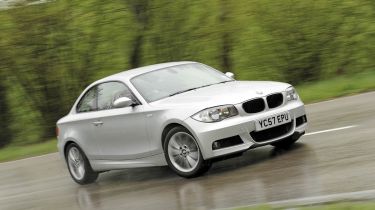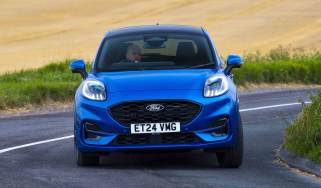BMW 123d
Rear-wheel-drive handling could be trump card in this shoot-out
The dictionary definition of a coupé is a car “with a fixed roof, two doors and usually a sloping back”. It’s a meaning that could do with updating, because traditional coupés in the style of the TT have to compete with a raft of new opposition.
What separates coupés from lesser models is the fact they look good and should make you feel great. And unfortunately, the 1-Series Coupé doesn’t have the same sense of individuality as its rival in this test. Rather, it aims to score with its sharp driving experience and a wide range of petrol and diesel engines.
From the front it retains the familiar face of all 1-Series models, while in profile the longer body resembles the two-door 3-Series. M Sport trim brings more aggressive bumpers and side skirts, but as an overall package the BMW still looks ungainly from some angles.
The trade-off for this is that the 1-Series Coupé retains much of the practicality of the hatchback. Unlike the TT’s, the rear seats can accommodate adults. And as the two-door BMW is 133mm longer than the hatch at 4,360mm, it offers a 370-litre load area – 40 litres bigger – and still comes with folding rear seats. So even though it has a much narrower boot opening, the 1-Series is the more versatile choice.
What the BMW can’t match is the Audi’s cabin design. The dash doesn’t feel as upmarket as its rival’s, even though the M Sport model gets a thick-rimmed steering wheel, chunky gearlever and metal-effect trim. While the 1-Series has a low-slung driving position, it isn’t especially cosseting, and looks too similar to the rest of the range.
The real highlight of the 123d is its engine. It’s based on the 120d’s 2.0-litre, but has twin turbos, and delivers gutsy performance. The smaller turbo works at low revs, while the bigger one responds higher in the range, so there’s no lag or hesitation anywhere in the powerband.
As a result, the 123d feels far more responsive in-gear than the TT. The 1,495kg BMW is 125kg heavier, which holds it back – it’s only slightly ahead in the benchmark 0-60mph sprint – but the instant acceleration in real-world conditions makes the 1-Series stand out.
It’s just a pity that it doesn’t have a sound to match. While the 123d unit is smooth enough, under acceleration the Audi has a more pleasing note, while at idle the BMW is a bit clattery.
Overall refinement is acceptable, thanks in part to improved run-flat tyre technology. The latest rubber has improved the 1-Series’ low-speed ride, and on the motorway tyre noise is also reduced. Nevertheless, the 123d’s suspension isn’t especially supple, and on rough surfaces the Coupé gets pitched about. It’s simply not as composed as the TT with its magnetic dampers.
Unfortunately, this lack of composure takes away some of your faith in the BMW’s rear-wheel-drive chassis. Although the 123d has the more communicative and weighty steering of the two cars, body movement is a bigger issue, and so it doesn’t inspire as much confidence on the entry to a corner as the Audi.
With an identical price, the BMW seems to represent fine value for money when you consider its greater practicality and more usable performance. But the TT has the advantage when it comes to residuals – although the key for many buyers will be which model is more desirable.
Details
Price: £26,350
Model tested: BMW 123d M Sport Coupé
Chart position: 2
WHY: It’s identically priced to the TT, but the BMW has a more powerful twin-turbocharged engine and a roomier interior.
Economy
During its time on test, the twin-turbocharged BMW returned 35mpg exactly. We had expected more considering it features stop-start and brake regeneration.
Residuals
The 123d is set to retain 48.4 per cent of its value after three years and 36,000 miles – a disappointing figure compared to the Audi’s. That means it will be worth £10,303.
Servicing
Buyers can specify the great-value fixed-price package. Three years’ servicing costs only £415, although full maintenance and five-year deals are available.
Tax
Despite featuring BMW’s stop-start technology, the 123d puts out 138g/km of CO2. That’s only 1g/km less than the TT. Both cars face an annual road tax bill of £120.



